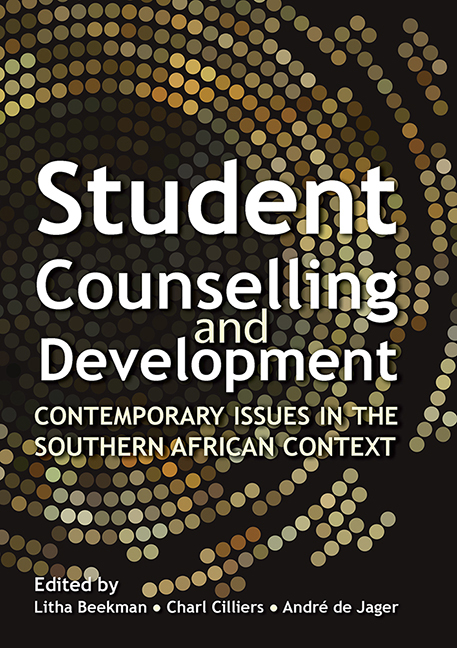 Student Counseling and Development in the South African Context
Student Counseling and Development in the South African Context Book contents
- Frontmatter
- Contents
- Figures
- Tables
- Preface
- Section 1 Development of Student Counselling and Development in Southern Africa
- Section 2 Theoretical Foundations of Student Counselling and Development in Higher Education
- Section 3 Services and Programmes Provided by Student Counselling and Development Units
- Section 4 Student Counselling and Development For Special Groups
- Section 5 Quality Assurance and Ethical and Professional Issues
- Contributors
- Index
Chapter 15 - Counselling Students With Disabilities
Published online by Cambridge University Press: 22 February 2020
- Frontmatter
- Contents
- Figures
- Tables
- Preface
- Section 1 Development of Student Counselling and Development in Southern Africa
- Section 2 Theoretical Foundations of Student Counselling and Development in Higher Education
- Section 3 Services and Programmes Provided by Student Counselling and Development Units
- Section 4 Student Counselling and Development For Special Groups
- Section 5 Quality Assurance and Ethical and Professional Issues
- Contributors
- Index
Summary
All people should have access to opportunities that enable them to develop their potential to participate fully in all aspects of society (UNHCHR, 2000).
INTRODUCTION
The plight of people with disabilities has received international attention since the declaration of the United Nations Decade of Disabled Persons in 1983-1992, followed by the Asia/Pacific Decade 1998-2002 and the African Decade for Disabled Persons in 2000-2009 (Anon., 2001). The Pan African Federation of Disabled Persons (PAFOD) and its affiliations in cooperation with the African Rehabilitation Institute (the official department within the former Organisation of African Unity, now the African Union) were responsible for the African Decade activities on the continent. Initiatives such as the African Decade can bring about change if there is political will from governments and it is transformed into action plans.
The South African government has risen to the challenge and has adopted a constitution (RSA, 1996) that makes specific provision for equal human rights for all citizens. The government conveyed the message of full participation of people with disabilities by appointing a parliamentary representative for disability issues, creating a national coordinating committee on disability and developing a National Integrated Disability Strategy in the Office of the President. A number of policies, laws and regulations have also been tabled to ensure that the rights of people with disabilities are acknowledged. The focus adopted views people with disabilities from a rights-based integrated approach instead of dealing with disability solely as a health and welfare issue. This approach is supported by a policy to develop an inclusive education and training system where learners with disabilities are admitted to primary, secondary and higher education (HE) institutions without discrimination (DoE, 2001a).
The theme of widening access is an international trend that is high on political agendas in the interest of social justice and economic competitiveness (Riddel, Tinklin & Wilson, 2005). Students with disabilities will enrol in increasing numbers at HE institutions because diplomas and degrees have become important requirements for employment in the 21st century knowledge-driven economy (Hitchings & Retish, 2000). Earnings correlate with level of qualifications and more and more students realise that they need to acquire under and post-graduate qualifications to improve their career options, and ultimately, their future economic opportunities.
- Type
- Chapter
- Information
- Student Counseling and Development in the South African ContextContemporary issuesin the Southern African Context, pp. 270 - 286Publisher: University of South AfricaPrint publication year: 2012
